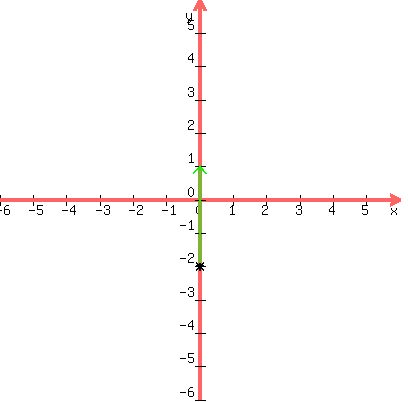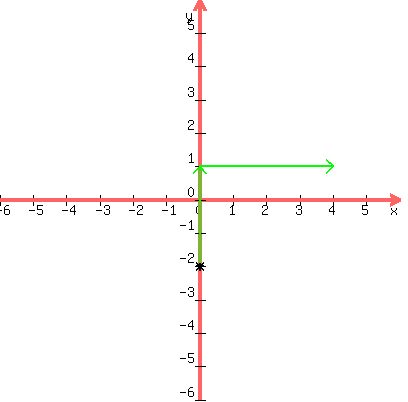draw the graph of the line 
 using its y-intercept and slope,
The y-intercept is the point (0,-2). Find -2 on the y-axis. Put a dot there:
using its y-intercept and slope,
The y-intercept is the point (0,-2). Find -2 on the y-axis. Put a dot there:
 Now look at the slope, which is
Now look at the slope, which is  , It has a numerator and a
denominator (if it were just a whole number you would put a 1 under
it so it would have a numerator and a denominator)
The slope is positive, so we start at the point -2 on the yaxis, and
from there we draw a line UPWARD the number of units of the NUMERATOR 3.
That is, we draw this green line UPWARD which is 3 units long:
, It has a numerator and a
denominator (if it were just a whole number you would put a 1 under
it so it would have a numerator and a denominator)
The slope is positive, so we start at the point -2 on the yaxis, and
from there we draw a line UPWARD the number of units of the NUMERATOR 3.
That is, we draw this green line UPWARD which is 3 units long:
 (You don't have to put an arrowhead on it like I did to
show that we went UPWARD.)
[If the slope had been negative, we would have drawn
it DOWNWARD)]
Now from that arrowhead, turn RIGHT (always RIGHT, even when the
slope is negative) and draw a line to the RIGHT which is the same
number of units long as the DENOMINATOR of the slope, which is 4.
So we draw this horizontal line from that arrowhead. I'll put
another arrowhead on it, but of course you don't have to, but you
can if you like :-)
(You don't have to put an arrowhead on it like I did to
show that we went UPWARD.)
[If the slope had been negative, we would have drawn
it DOWNWARD)]
Now from that arrowhead, turn RIGHT (always RIGHT, even when the
slope is negative) and draw a line to the RIGHT which is the same
number of units long as the DENOMINATOR of the slope, which is 4.
So we draw this horizontal line from that arrowhead. I'll put
another arrowhead on it, but of course you don't have to, but you
can if you like :-)
 Next get a ruler and draw a line through the point you
started at, the y-intercept (-2,0) through that second
arrowhead like this:
Next get a ruler and draw a line through the point you
started at, the y-intercept (-2,0) through that second
arrowhead like this:
 That's the graph of the equation
That's the graph of the equation 
and i need to know the x and y intercepts
The y-intercept we have already taked about. It is (0,-2).
The x-intercept can be found either by:
1. Looking at the graph and noticing the the graphed line
crosses the x-axis at a point which we can estimate as being
about  of the way between
of the way between  and
and  , so
the x-intercept is (
, so
the x-intercept is ( ,0).
2. Substituting
,0).
2. Substituting  into the equation of the line:
into the equation of the line:



 Multiply all terms by 4:
Multiply all terms by 4:


 So the x-intercept is (
So the x-intercept is ( ,0), and
,0), and  is the same as
is the same as  .
Edwin
.
Edwin